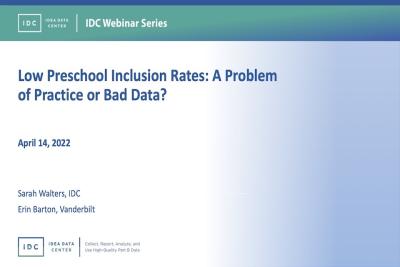The Preschool Environments Toolkit provides materials and resources to help state education agencies (SEAs) and local education agencies (LEAs) collect, report, analyze, and use preschool environments data. State Part B data managers, 619 coordinators, local 619 personnel, technical assistance providers, and other interested parties can use the toolkit to help them report Educational Environments data for children ages 3 through 5 with disabilities enrolled in preschool and receiving services under Part B of IDEA. The toolkit includes materials related to IDEA Section 618 federal reporting requirements and populating Part B SPP/APR Indicator 6, and it offers a Preschool Environments Calculator and Data Analysis Tool to help states calculate and analyze Indicator 6 preschool educational environments data.
Resource Files & Links
Related Content
News: AnnouncementsBlog PostIDC Buzz
High-Quality Preschool Environments DataCollecting and reporting high-quality preschool environments data for State Performance Plan/Annual Performance Report (SPP/APR) Indicator 6 can be a complex and multilayered responsibility for states and districts. It starts at the preschool child’s individualized education program (IEP) meeting, where IEP team members select the most appropriate preschool environment for the child to receive special education and related services. Team members need to understand the differences among the preschool environments and the reasons for serving a child in a particular environment in order to make decisions about serving preschool children in the least restrictive environment (LRE). State information systems (or statewide IEP systems) then must accurately reflect each of these team decisions in order to produce high-quality preschool environments data.
Event: Webinar
Low Preschool Inclusion Rates: A Problem of Practice or Bad Data?SPP/APR Indicator 6A data have not budged in decades. Is it true that there hasn’t been progress on inclusion for preschoolers with disabilities or are data quality issues preventing us from seeing progress? Join us to explore solutions to promote...



